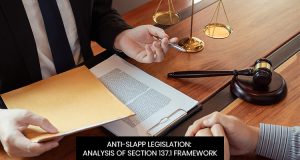
What Is SLAPP?
In 1704604 Ontario Ltd v Pointes Protection Association, 2020 SCC 22, the SCC was tasked with interpreting and applying the section 137.1 framework of the Court of Justice Act, RSO 1990, c C. 43 – also known as Anti-SLAPP legislation. For those unfamiliar with the acronym SLAPP (Strategic Lawsuits Against Public Participation), a SLAPP is a cynical legal strategy employed by Plaintiffs to dissuade whistleblowers and the public from intervening in matters of public interest. While SLAPPs are usually unsuccessful in court, the SCC affirmed the importance of anti-SLAPP legislation in preserving freedom of expression as a fundamental right and value in a democratic society.
The Section 137.1 Framework:
Section 137.1(3) places an initial threshold burden on the moving party to satisfy the judge that the proceeding against them arises from an expression made in the public interest. In comparison, section 137.1(4)(a) is a merits-based hurdle, where the Plaintiff must satisfy the motion judge
(a) there are grounds to believe that,
(i) the proceeding has substantial merit, and
(ii) the moving party has no valid defence in the proceeding; and
(b) the harm likely to be or have been suffered by the responding party as a result of the moving party’s expression is sufficiently serious that the public interest in permitting the proceeding to continue outweighs the public interest in protecting that expression.
Thus, even if a proceeding clears the merits‑based hurdle in section 137.1(4)(a), it is still vulnerable to summary dismissal resulting from an outweighed interest in protecting public expression under section 137.1(4)(b).
Key Takeaway
The weighing exercise of section 137.1(4)(b) is the final fundamental analysis. Section 137.1(4)(b) optimizes the balance between the public’s interests in allowing lawsuits with merits to proceed and in protecting expression on matters of public interest by which anti-SLAPP legislation seeks to address. The burden is on the Plaintiff to show that it has suffered, or will likely suffer harm, that such harm results from the expression established under s. 137.1(3), and that the corresponding public interest in allowing the underlying proceeding to continue outweighs the effects on expression and public participation. The provision expressly requires that one consideration outweigh the other, which is substantively different from balancing the considerations against one another.
Each case must be assessed on its own set of facts. If you have any questions regarding this blog, or someone you know needs legal help with family matters, BOZAI LAW PC is a full-service firm that serves clients across the GTA and Ontario.
Disclaimer: Use of this site and sending or receiving information through it does not establish a solicitor/client relationship. The views expressed and the content provided on this blog is for non-profit, educational purposes. It is not, and is not intended to be, legal advice on any specific set of facts. If you require legal advice, you should contact a lawyer directly.




0 Comments